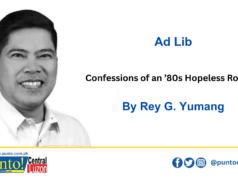…OUR GOSPEL today is about the silence of a sick man, and how Jesus makes him speak again.
Silence is generally a positive thing in the realm of human experience. We commonly associate it with prayer and meditation, with the kind of atmosphere needed for productive thinking and quality research work, with rest and the opportunity to regain one’s equilibrium, with attentiveness and concentration.
But sometimes it can also be negative, such as when people go into a state of depression and isolate themselves, or when people are so traumatized they shut the world off in order to cope, or when fear of persecution makes people capitulate to a repressive political system. In our Gospel today, Jesus deals with the negative silence of a man who is “possessed by a demon.”
I have said in many instances that the vocabulary of “devil possession” in the Scriptures need not mean exactly what it means to many people nowadays. They lived in a world that was yet clueless about the complex dynamics of the human psyche. But they knew, somehow, that on many instances, people could withdraw into negative silence because they were tormented by many inner “voices”, such as those that repeatedly tell them that they are worthless, that they are good for nothing, that they are hopeless, that they deserve their misery.
Don’t we hear of people who suddenly close their Fb account after being attacked by an army of trolls who verbally abuse them? Or children who clam up after being bullied? Sometimes, what some people can easily dismiss or ignore can be extremely disturbing to others, especially those with a low self-esteem. “Don’t let it get into your system” can be a tall order for some people; it is always easier said than done. It can plunge them into the silence of self-isolation.
Not only was Jesus constantly attacked by people who did not welcome his teachings and his ways, we’re told that he was even accused of being an agent of Beelzebull, the prince of demons. There is no end to the capacity of some people to be mean, cruel or brutal. But how did Jesus deal with them? Matthew suggests to us that Jesus simply did not allow them to hinder him from carrying out his mission. Instead of being bogged down by his detractors, “he went around all towns and villages”, preaching those who were disposed to listen to him, and attending to those who were sick or tormented by evil spirits.
There were instances when Jesus did not find the need to react to his tormentors. Perhaps he knew that all they wanted was precisely to unsettle or distract him. But he was deeply affected by the silent sufferings of the people who were sick and afflicted by diseases, people who were “harassed” or, as we say in modern vocabulary, “stressed out”, and people who were “helpless,” meaning, those who were despairing or feeling hopeless. Matthew tells us it was these people that moved Jesus to the core—people who felt abandoned and dejected, like “sheep without a shepherd”.
I wonder if you noticed the paradoxical shift in the last lines of this Gospel. Matthew tells us he was distressed by the sight of the poor and the sick. And yet, he saw in them what he called “a rich harvest,” for which he needed more laborers. How does one make sense of this?
Jesus often portrayed God’s Word as seeds of the heavenly kingdom that need to be propagated here on earth. He often described the act of proclaiming the Word as an act of sowing. How indeed can you expect a harvest if you have not sown anything? He also knows that seeds don’t just grow anywhere; they need a fertile soil. So also with God’s Word. Not all people are disposed for the good news.
No wonder Jesus loved to quote the prophet Isaiah who says “He has sent me to bring good news to the poor.” For the prophet Isaiah, the Good news is FOR THE POOR! It will not be welcomed by those who think they have already found their wealth in passing things. In the famous parable of the Sower, Jesus compares these ones with soil full of weeds; they have no space for the seeds to germinate in.
God’s kingdom is a treasure that will be sought only by those who acknowledge their poverty, not those who are already self-sufficient. Remember the words of the book of Revelation 3:17 “For you say, ‘I am rich and affluent and have no need of anything, ’ and yet do not realize that you are wretched, pitiable, poor, blind, and naked.”
If the Good News of God’s kingdom is welcomed like seeds by the good soil of poverty, how can you not expect a rich harvest indeed from the poor who are evangelized? You do not expect a rich harvest from empty grains, from those who have lived empty lives, those who have lived only for themselves.
This pandemic has reduced us to a different kind of poverty. It has made us come to terms with our vulnerability and made many people more disposed for the seeds of Gospel. When I think of the millions who are present in the social media and I hear of fellow bishops, priests, men and women religious and lay leaders proclaiming God’s Word in many new and creative ways in the digital world, I can only sigh and say, “How rich indeed is the harvest that awaits us.”
(Homily for 7 July 2020, Tuesday of the 14th Week in Ordinary Time, Matthew 9:32-38)





